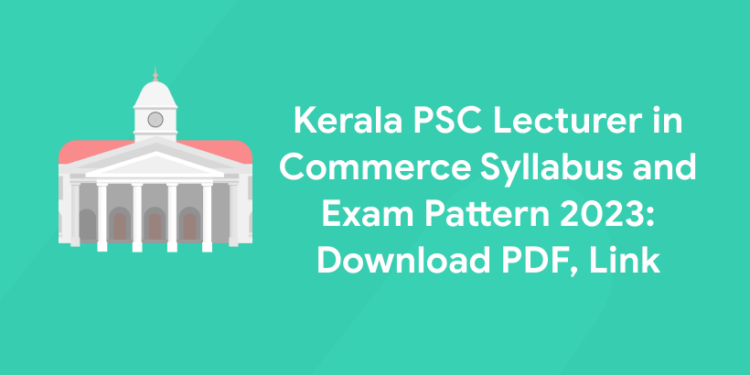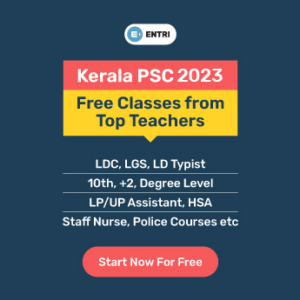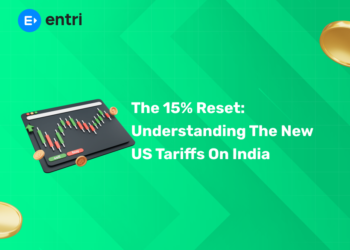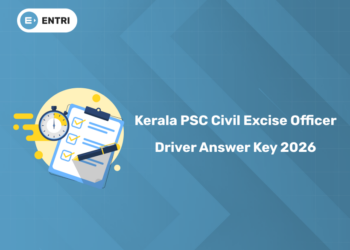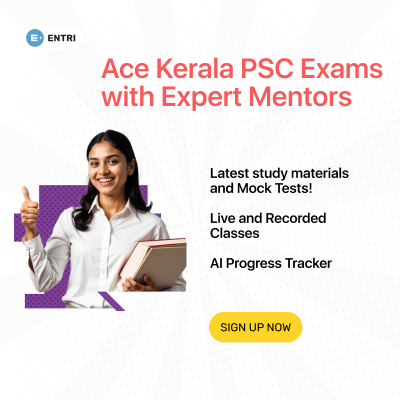Table of Contents
The Kerala PSC Lecturer in Commerce Syllabus 2023 is out now! Candidates interested in the post must download the syllabus and start preparing. The exam will consist of two phases, prelims and mains, both of which are mandatory. The prelims will include objective type questions of 100 marks. Those who clear Kerala PSC Lecturer prelims will be called for mains exam 2023. The Kerala PSC Lecturer in Commerce Syllabus 2023 provides an in-depth explanation of the topics that will be featured in the exam. To view the syllabus, visit the official website and download the PDF. The syllabus link has also been provided for easy access. Make sure to read through the syllabus thoroughly and start preparing in advance. All the best!
Download Entri app and start preparing for KPSC Exams!!!
Kerala PSC Lecturer in Commerce Exam Pattern and Syllabus 2023: Highlights
| Particulars | Details |
| Name of recruiting organization | Kerala Public Service Commission (PSC) |
| Name of department | Various |
| Name of post | Lecturer in Commerce |
| Category number | 384/2022, 385/2022 |
| Recruited for | Statewide |
| Number of vacancies | As per Notification |
| Type of Exam | OMR |
| Number of Questions | 100 |
| Total Marks | 100 |
| Medium of Questions | Malayalam/ Kannada/ Tamil |
| Mode of application | Online |
| Mode of recruitment | Direct Recruitment |
| Exam Duration | 2 Hours |
| Official Website | www.keralapsc.gov.in |
Kerala PSC Lecturer in Commerce Syllabus 2023: Release Date
1: The first recipient of the ‘Rajiv Gandhi Khel Ratna’ award?
The Kerala Public Service Commission (KPSC) has released the syllabus for the Lecturer in Commerce recruitment 2023 on September 2023. The syllabus consists of topics related to General Knowledge, English, Mathematics, General Principles, and Others. All those aspiring for the Lecturer in Commerce job are required to study the syllabus thoroughly.
The syllabus is available in PDF format for easy download from the KPSC official website. The syllabus contains important subject-wise topics and examination pattern. Besides the KPSC website, the syllabus can also be downloaded from the third-party websites. The syllabus link can be found in the KPSC official page and the websites of the third-party sources. The candidates should study the syllabus thoroughly to understand the topics involved in the recruitment exam. It is important to be well prepared for the exam and secure more marks. But it is not enough to just read the syllabus. One should also practice sample papers and mock tests to become familiar with the exam pattern. Thus, the Kerala PSC Lecturer in Commerce Syllabus 2023 provides a comprehensive understanding of the topics to be covered in the recruitment exam. It can be accessed from the official website of KPSC and the websites of third-party sources. The candidates should go through the syllabus properly to ace the exam.
Enroll in Kerala's Top-rated HSA Coaching Program!
സർക്കാർ ജോലി എന്ന സ്വപ്നം ഇനി സ്വപ്നം മാത്രമല്ല! Join Entri's HSA Coaching Program
Join Now!Kerala PSC Lecturer in Commerce Recruitment 2023: Exam Date
Kerala PSC has released the Lecturer in Commerce exam date for the year 2023. The written exam will be held on October 16, 2023. Candidates who have applied for the post can now download their Lecturer in Commerce Admit Card from the official website of Kerala Public Service Commission. The admit card will provide detailed information like your name, roll number, exam date, time and venue. Candidates are advised to download their admit card at least 10 days prior to the exam as without it, they will not be allowed to attempt the exam.
Kerala PSC Lecturer in Commerce Recruitment 2023: Admit Card
The Kerala Public Service Commission (Kerala PSC) has released the Kerala PSC Lecturer in Commerce hall ticket 2023 on October 30, 2023. Candidates can download the hall ticket from the official Kerala PSC website. It is mandatory for all the aspirants to carry a valid hall ticket to enter the exam hall. Candidates should also carry an identity proof along with the hall ticket during the exam. The hall ticket contains important details like candidate’s name, roll number, exam centre, date, and time.
To download the admit card, candidates should follow the steps given below:
Step 1: Visit the official website of Kerala PSC.
Step 2: Enter your registration number/User ID and date of birth to login
Step 3: Click on the ‘Admit Card’ section.
Step 4: Your admit card will be displayed on the screen.
Step 5: Download and take a print out of your admit card.
You can use the provided link below to download the Kerala PSC Lecturer in Commerce Admit Card 2023 without having any trouble
Candidates should also bring a valid photo ID proof along with the admit card. Without it, they will not be allowed to enter the exam hall. All the best!
Kerala PSC Lecturer in Commerce Recruitment 2023: Important Dates
| Event | Dates |
| Kerala PSC Lecturer in Commerce Admit Card 2023 | September 30, 2023 |
| Kerala PSC Lecturer in Commerce Exam Date 2023 | October 16, 2023 |
| Kerala PSC Lecturer in Commerce Shortlist 2023 | Notify Later |
| Kerala PSC Lecturer in Commerce Rank List 2023 | Notify Later |
| Kerala PSC Lecturer in Commerce Answer Key 2023 | Notify Later |
Enroll in Kerala's Top-rated HSA Coaching Program!
സർക്കാർ ജോലി എന്ന സ്വപ്നം ഇനി സ്വപ്നം മാത്രമല്ല! Join Entri's HSA Coaching Program
Join Now!Kerala PSC Lecturer in Commerce Syllabus 2023: Download PDF
The Kerala PSC will conduct the Lecturer in Commerce Exam on October 16, 2023. The syllabus must be familiar to all applicants in advance because the exam will be challenging. The syllabus for the Kerala PSC Lecturer in Commerce Exam 2023 is now available. The syllabus PDF is available for download at the link mentioned below for qualified candidates.
Find the Kerala PSC Lecturer in Commerce Syllabus 2023 PDF for the category number 384/2022, 385/2022 below.
Kerala PSC Lecturer in Commerce Exam Pattern 2023
- Total Number of Questions: 100
- Total Marks- 100
- Each question carries 1 marks
- Duration of examination – 2 Hours
| Topic | No. of Questions | Total Marks | Time Duration |
| General Subject (Part One) | 50 | 50 | 2 Hours |
| General Subject (Part Two) | 50 | 50 | |
| Total | 100 | 100 |
Kerala PSC Lecturer in Commerce Syllabus 2023: Detailed
Unit 1: Community Resources
- Resources that enhance or facilitate the lives of people in a community – examples of community resources are factories, educational institutions, cinema halls, libraries, religious places, hospitals, community centers, parks, etc – make use of these resources in education as it develops a sense of value and belonging among students.
Unit 2: Community Engagement
- Community Engagement in Education – and symbiotic relationship that exists between communities and Education Institutions – sustainable networks, partnerships, communication media, and activities – Linking formal learning and the local community
Unit 3: Forms of community engagement
- Community-student engagement -Researching with the community, sharing knowledge with the community, Designing new curriculum and courses, Involving local practitioners as trainers, Social Innovation by students and the like
Unit 4: Practices for Community engagement
- Engagement practices and activities – formal or informal – include building relationships through collaboration initiatives, community campaigns, Community Survey, Community services, Excursions, cooperatives, small businesses, consultation meetings & conferences, sports events, cultural events, community development and community research projects.
Unit 5: Rural Community Development
- Social, economic, political and cultural framework of the rural society – Rural Resilience – Rural Institutions Close to Community, Participatory Learning – Approaches and Methods, Community Project Proposals and Project Management, Community living camps, Engagement with – School, Street Committee, Health Centre, Panchayat, SHGs – Programmes
Module II : Syllabus for General Subject – ICT in Education Total: 10 Marks
Unit 1: Potentials of ICT in Education
- ICT as a means to connect with the world – Pedagogy and ICT – Potentials and Advantages of Approaches to ICT
- Unit 2: ICT integration in Curriculum transaction
Computer based Curricular planning- ICT Based Model of Curriculum Transaction – Considerations for integrating ICT – Innovations in Curriculum Transaction
Unit 3: ICT and Internet Resources for Teaching and Learning
- Resources – Access and Creation, resource mobilization – Web-based learning, Social Networking –Virtual learning Environment – Designing e-initiatives
Unit 4: ICT in Classrooms
- Creating Personal learning environments – ICT integrated Inclusive education – Assistive and Adaptive technologies
Unit 5: ICT for Assessment and Evaluation
- Purposes and Techniques of Evaluation, Scope of ICT for evaluation- Innovative Practices in Assessment & Evaluation
Module 3 : PERSPECTIVES OF EDUCATION (10 Marks)
PHILOSOPHICAL PSYCHOLOGICAL AND SOCIOLOGICAL PERSPECTIVES OF
EDUCATION
Philosophical perspectives of Education
- Role of education in philosophizing the issues of life –Metaphysics, Epistemology, Logic, Phenomenology, Aesthetics and Axiology. Critical appraisal of schools of philosophy in the context of Twenty First Century – aims, content, methods an ongoing changes. Focus of education in the 21st century. Building perspectives on educational philosophies. Modern schools of Philosophy-Empiricism, Positivism, Relativism.- Post -structuralist views and eclectic views. Comparative study of philosophies and educational contributions of Indian and western thinkers
Psychological perspectives of education Learning and development
- Learner Characteristics and Learning styles with special reference to pre- primary, primary, secondary, higher secondary and adult learners Learning in twenty first century classrooms., Characteristics And types, Development – language development, emotional, moral, motor and identity development. Cognitive Functions Thinking, Reasoning, Problem Solving and Meta-cognition, Personality- types characteristics and development Intelligence-different types~ Multiple, Cultural, social and emotional, impact on learners. Mental Health-, Factors affecting Mental Health (parents, family environment, society, school practices) – Strategies for enhancing Mental health
Sociological perspectives of education
- Education for social security, wellness and progress, sustenance and transformation in society. Determinants of social change in the context of globalization.-Constraints on social change in India with respect to caste, ethnicity, class, language, religion, gender, regionalism, political interest
- Education and Secularism – Role of teacher in inculcating democracy and international values.- Pluralism – Role of education in creating unity in diversity- Nationalism and education.-Role of Education in addressing cultural lag, privatization, globalization and partnership in social progress – Current trends in social development and transformation of values in society.
Module 4 : Teaching aptitude (10 Marks)
Teaching aptitude.
- Teaching -characteristics, levels, phases and maxims
- Teaching methods, techniques and strategies
- Modern trends in professional development and ethics
- Technology integration in education
- Research, evaluation and innovations in classroom teaching, –
Module 5 : Research Aptitude (10 Marks)
- Research Meaning, Characteristics and Types
- Steps to Research
- Methods of Research
- Aims of Educational Research
- Research Ethics
- Research paper, Article, Workshop, Seminar, Conference and Symposium
- Thesis writings – its characteristics and Format
PART II (50 Marks)
MODULE 1: Conceptual bases of Commerce Education
- Commerce education: Meaning, Definitions and Nature – Academic and Vocational.
- Scope and Development of Commerce Education – academic, economic, social, international.
- Historical development and Modernization of commerce through technological advancement and LPG.
- Aims, objectives Values and Outcomes of Teaching Commerce
- Interdisciplinary and multi-disciplinary approach in Commerce Education
- Outcome based education in commerce
MODULE 2: Nature and Scope of Pedagogical content knowledge analysis in Commerce (4 Marks)
- Pedagogical content knowledge analysis (PCK) – Meaning, Scope, Features of PCK analysis
- Significance of PCK analysis in commerce discipline.
- Relationship between pedagogic with content analysis Content Analysis – Procedure, facts, concepts, principles, process, rules, equations.
- Inter relationship between Technology – Pedagogy – Content
- Scope and purpose of Techno-Pedagogic Content Knowledge Analysis in commerce.
- Commerce Education and Bloom’s revised taxonomy
MODULE 3: Curriculum Design and Development in Commerce (6 Marks)
- Meaning, definition and functions of Curriculum.
- Modern trends in the construction of curriculum; Curriculum mapping; Approaches and Principles of Curriculum Construction
- Types of Curricula; Curriculum implementation and renewal; critical evaluation of the present Higher Secondary Commerce Curriculum
- Curriculum Designs and Models – ADDIE, ASSURE, 5 E
- Theroretical bases of Curriculum development – Constructivism, Multiple Intelligence; Emotional Intelligence; implications in Commerce Education
- Brief sketch about NCF 2005/KCF 2007/NEP 2020 with special reference to vocational and entrepreneurship education.
- Curriculum transaction: meaning and modes – Face to face mode, ICT enabled mode, blended mode and distance mode.
- Experience with e – curriculum designs – Design e-content, digital texts and e – transactional platforms
- Curriculum Evaluation and Assessment – Methods and approaches
MODULE 4: Instructional Resources and Pedagogical Practices (10 Marks)
- Instructional Resources in Teaching and Learning of Commerce – IT enabled instructional resources – School and Community Based Instructional Resources in Teaching Commerce – E –Twinning practices for resource sharing – Learning management system (LMS) in teaching learning of commerce education.
- Instructional Models, Strategies, Methods and Techniques – Suitability and criteria for selecting appropriate instructional model/strategy/method/technique in Commerce.
- Models of teaching – Introduction, Operational Heart, Different families, Concept Attainment Model, Inquiry Training Model, Group Investigation Model, Cognitive Apprenticeship Model
- Instructional strategies – Co-operative learning strategies, Collaborative learning strategies, Scaffolding strategies. – Experiential learning, blended learning, problem-based learning, teaching thinking skills, graphic organizer – Strategies to deal with Children with Special Needs (CWSN) – differently able, slow learner, advance learner, IED learner and ADH.
- Instructional methods – Lecture Method, Project method, socialized methods Group discussion, seminar, debate, symposia, workshop, Problem solving method, Case studies, Source method, Inductive and Deductive, Analytical and Synthetic method.
- Techniques of Teaching –Brain storming, Role play, Buzz session, simulation, Quiz session.
Module 5 : Global trends in commerce education (10 Marks)
- Global trends in commerce education – opportunities and challenges
- Technological developments in Commerce – e commerce, e banking, online trade and market, e governance, green business practices, Marketing Automation, Artificial Intelligence (AI), Mobile Commerce, Augmented Reality, virtual reality.
- Entrepreneurship development and education – Start up initiatives, skilling, Entrepreneurship skills and competencies, ASAP programmes.
- Financial management skills and competencies, Consumer education – exploitation, protection, consumer rights, laws and policies
- Accounting skills – Core Generic Skills in Accounting – Strategies for developing problem solving skills in accounting and book keeping.
Module 6: Assessment in Commerce Education (5 Marks)
- Strategies of Assessment in Commerce Education – Formative and Summative Evaluation, Criterion Referenced and Norm Referenced Test, Continuous and Comprehensive Evaluation Diagnostic test, Achievement test (OBE model), Performance test, prognostic test.
- Qualitative assessment – Self-reflection, Peer evaluation, reflective journal, Portfolio and e portfolios, Rubrics.
- Tools and techniques for assessment – e assessment tools
- Recent trends in Evaluation: Grading-Portfolio assessment; Rubrics, Standardization of Achievement test in Commerce; Evaluation of projects and seminar; E-assessment; computer assisted assessment; Online assessment tools; online quiz; online test.
Module 7: Technology for instruction in Commerce (7 Marks)
- Need and importance of technology in Commerce learning; IT enabled instructional resources; significance of online and web resources: videos, YouTube resources, animations, film clippings, e-journal, educational blogs, C.D’s, SAMAGRA, Educational broadcasting -VICTERS Channel, Video conferencing and Tele conferencing in teaching of commerce,.
- Computer Assisted Instruction- Simulation, Tutorial, Gaming, Computer Managed Instruction, Computer Managed Learning
- Concept of e-learning- m-learning, blended learning, Multimedia learning
Module 8: Research in Commerce Education(5 Marks)
- Need and importance, Recent researches in Commerce learning with special
emphasis to instructional strategies, curriculum designs, assessment. - Ways and means for generating research culture, Researches on teaching students with diverse learning needs: different modalities and novel modes
- Researches on capacitating Technology in Commerce learning.
How to Download Kerala PSC Lecturer in Commerce Syllabus?
Follow the below steps to download Lecturer in Commerce Syllabus
- Visit official website at https://www.keralapsc.gov.in
- Click on “Download” Tab
- Choose syllabus from the dropped menu
- Download Kerala PSC Lecturer in Commerce Syllabus
- Download and Take a print out for further reference


